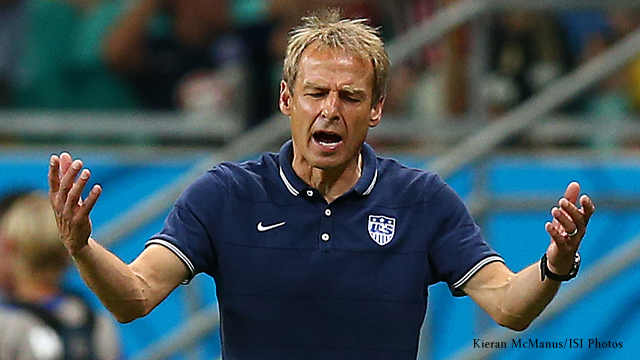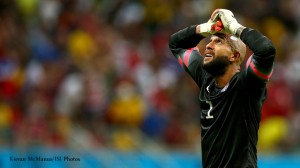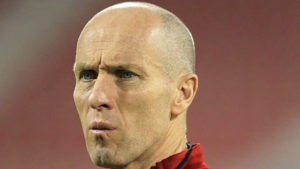USMNT show same courage, same heart, same defects in World Cup defeat

The U.S. Men’s National Team have shown bravery, unity and commitment throughout their long road from the storms and heat waves of CONCACAF qualifying to the knockout stages of the World Cup.
And they went down swinging as that road ended at the hands of Belgium in Salvador, Brazil on Tuesday evening, battling to the last moment of a 120-minute extra-time thriller that ended 2-1 to the European side, but was there for the Yanks’ taking in the final moments.
[ +READ: World Cup: U.S. Men fall 2-1 to Belgium in extra time as late rally falls short ]
As goalkeeper Tim Howard put it last week in the run-up to his team’s group-stage finale against Germany in Recife, the USMNT “wanted to be going into this last game feeling like we have a chance” – and a similar opportunity was afforded to them in this marathon round-of-16 duel at Arena Fonte Nova.
Belgium took nearly 40 shots; 17 of them headed on target, forcing the scintillating Howard to make a World Cup-record number of saves. The Red Devils were incisive and menacing both on the dribble and in combination play, in methodical buildup as well as swift counterattacks – especially when the one-man wrecking crew that is Romelu Lukaku came on at the start of extra time. They earned a whopping 19 corner kicks, for goodness’ sake.
All the same, this one was within the Americans’ reach, only to slip away – much like that galling loss to Ghana four years ago at the same juncture of South Africa 2010 – via late mistakes that resulted from a long, painful backslide into reactive play and a passive mindset.
Like the most iconic U.S. goalkeepers of the program’s past – to whom he should undoubtedly be compared, if he hasn’t been already – Howard seized the moment and kept his team in contention of a match that could easily have ended 3-0 or 4-0 in Belgium’s favor.
“That’s my job,” Howard said in a postgame interview. “That’s what I signed up to do. It’s part of it. In these big games against top-quality competition, the levee is going to break at some point if we continue that. Hats off to Belgium – they were fantastic.
“It’s disappointing to go out this way,” he added. “But we need to be honest with ourselves and know that there’s still work ahead of us and we have to keep getting better and keep working.”

But even heavy doses of classic American ingredients like guts, fight and great goalkeeping were not enough to overcome the damaging effects of so many chances conceded – made possible by the same old struggles to sustain possession or set tempo beyond the furious late comeback that provided a tantalizing glimpse of what might have been. Why did it take the imminent prospect of World Cup doom to goose the U.S. forward in numbers?
The answer, I suspect, with all due respect to head coach Jurgen Klinsmann‘s lofty long-term goals (remember, he’s now the technical director as well as the senior men’s national team coach), is that the basic blueprint for on-the-field action hasn’t actually changed much since 2010.
Run hard. Compete for every ball. Defend like tigers. Make use of set pieces and quick counters. Try to build play with sustained possession, but if it’s not working, adapt to whatever the situation calls for.
[ +READ: Why are CONCACAF nations impressing at this World Cup? ]
After three years of experimentation, tweaking and multiple waves of roster turnover, Klinsmann wound up fielding a determined blue-collar team that did the nation proud – and it looked a lot like the one that did much the same under his predecessor Bob Bradley. Is Klinsmann a supreme pragmatist? A genius alchemist? Or just another overpaid name throwing stuff at the wall to see what sticks?
 It’s altogether possible that Klinsmann squeezed every drop out of the talent at his disposal. He may also have a Magic 8-Ball, as so many of his seemingly outlandish decisions appeared to pay off, like the selection of young tyros like John Brooks, DeAndre Yedlin and Julian Green. Keying the renaissance of the 32-year-old midfield metronome Kyle Beckerman was also a masterstroke.
It’s altogether possible that Klinsmann squeezed every drop out of the talent at his disposal. He may also have a Magic 8-Ball, as so many of his seemingly outlandish decisions appeared to pay off, like the selection of young tyros like John Brooks, DeAndre Yedlin and Julian Green. Keying the renaissance of the 32-year-old midfield metronome Kyle Beckerman was also a masterstroke.
However, the sweeping powers granted to him by U.S. Soccer Federation president Sunil Gulati – most importantly, the contract extension that will keep Klinsmann in his current posts through the next World Cup cycle – mean that the California-based German deserves the lion’s share of both the credit and the fault for the USMNT’s performances.
He picked this roster. He overhauled his coaching staff just weeks before the World Cup. He was given ample financial and logistical resources with which to prepare for the tournament. Most importantly, he’s been given three years of lead-in time: Plenty of time and opportunity to evaluate his players and inculcate them with his ideas and systems.
[ +READ: Good enough: “Job well done” as weary USMNT book World Cup advancement ]
But those ideas seem more and more like vague talking points with each passing press conference, and the systems have varied wildly, not just since 2011 but since April. He took a roster to Brazil that was stacked in some places and paper-thin in others (if target man Jozy Altidore is so essential to the team’s approach, why on earth didn’t you bring a like-for-like replacement?).
In Salvador Klinsmann roamed the technical area like a man possessed, his taut reactions to every play on display for the world to see. Perhaps that’s more inspiring and compelling to the USMNT’s swelling legions of fans than the stoic Bob Bradley. But has his team’s style actually matured?
And if it hasn’t, how many more years should we wait before drawing our conclusions?











